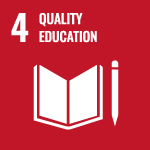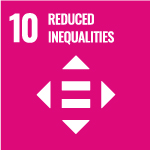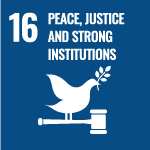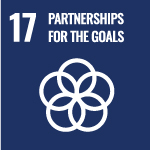The Wheelguide Certification and the SDGs
The Wheelguide program promotes accessibility and inclusion and assists companies and enterprises to achieve the UN Sustainable Development Goals (SDGs)
Wheelguide is a global accessibility services platform that aims to provide a more autonomous and inclusive life for all.
With a wide range of activities, the certification simultaneously reaches two universes: the general public, through its awareness campaigns and its technological services, and companies, through its Professional Certification Services and its training and engagement platform.
Wheelguide Certification
The Wheelguide Certification is a program that enhances and recognizes the best practices of accessibility and inclusion in companies and enterprises. Its original methodology was developed by an interdisciplinary team, composed by specialist architects, researchers and people with disabilities. It is based on the premise that accessibility should be seen as a continuous exercise and on the concept that “accessible environments” are made by both the physical structure and the people in it.
Thus, the evaluation goes beyond compliance with current legislation and technical standards prepared by regulatory bodies. By understanding accessibility as a living organism and incorporating human factors, the process of evaluation also takes into account the practical experience of people with disabilities as well as the perception of the regular users of space, besides interpersonal treatment aspects.
As a direct consequence, the certification process contributes to the ESG factors: Environmental, Social and Governance, since the work carried out in addition to being guided by local norms and laws, also strengthens policies and labor relations based on the values of inclusion and diversity, employee’s engagement, workforce training, human rights and relations with communities.
The first step of the certification process is the technical evaluation made by architects specialized in accessibility. The first step aims to verify compliance with technical standards and laws regarding accessibility, in particular the Brazilian laws, NBR9050/2020 – Accessibility to buildings, equipment and the urban environment of the Brazilian Association of Technical Standards (ABNT – in Portuguese), and Federal Law No. 13,146 of 2015 – Brazilian Law of Inclusion (LBI – in Portuguese). This evaluation is carried out in project (if applicable) and on site accompanied by people with disabilities and / or mobility restriction. The objective is to add a functional look to the evaluation. When moving around the facilities, the accessibility of the environments is also experienced in practice.
For enterprises in operation, actions to engage and encourage volunteering are done internally to the company or building in partnership with the team by inviting the occupants of the space to make their own evaluation through the Wheelguide app. In addition to enriching technical analysis, these actions have the important mission of raising awareness.
Impact
The 2030 Agenda, created by the UN in 2015, is an action plan which sets 169 goals, organized in 17 Sustainable Development Goals (SDGs), which guide a collaborative work of all countries and all stakeholders in search of strengthening universal peace with more freedom.
The Agenda seeks to achieve putting into practice the human rights of all, balancing the three dimensions of sustainable development: economic, social and environmental. Each of the SDGs defines an area of work, being subdivided into goals, which serve as a “map” to guide the work of governments, companies, NGOs and civil society in the direction of these major global goals.

The Wheelguide Certification focuses on contributing to the following SDGs (and their respective goals):

OBJECTIVE 4
Ensure inclusive and equitable quality education and promote lifelong learning opportunities for all.
- 4.a Build and upgrade education facilities that are child, disability and gender sensitive and provide safe, non-violent, inclusive and effective learning environments for all.
Many people with mobility restrictions have their activities hindered by the lack of accessibility in educational institutions. Through the process for the Wheelguide Certification, we help educational institutions prepare to include all people in the educational environment, removing the architectural and attitudinal barriers which prevent full access for all.

OBJECTIVE 8
Promote sustained, inclusive and sustainable economic growth, full and productive employment and decent work for all.
- 8.5 By 2030, achieve full and productive employment and decent work for all women and men, including for young people and people with disabilities, and equal pay for work of equal value.
- 8.8Protect labour rights and promote safe and secure working environments for all workers, including migrant workers, in particular women migrants, and those in precarious employment.
Through the work of the Wheelguide Certification, we help companies and enterprises to prepare to include all people in their staff.

OBJECTIVE 10
Reduce inequality within and among countries.
- 10.2 By 2030, empower and promote the social, economic and political inclusion of all, irrespective of age, sex, disability, race, ethnicity, origin, religion or economic or other status.
- 10.3 Ensure equal opportunity and reduce inequalities of outcome, including by eliminating discriminatory laws, policies and practices and promoting appropriate legislation, policies and action in this regard.
Through the Attitudinal Accessibility Training, i.e., the Accessible Attitude of people, we contribute to the elimination of barriers that hinder the full integration of all people.

OBJECTIVE 11
Make cities and human settlements inclusive, safe, resilient and sustainable.
- 11.3 By 2030, enhance inclusive and sustainable urbanization and capacity for participatory, integrated and sustainable human settlement planning and management in all countries.
- 11.7 By 2030, provide universal access to safe, inclusive and accessible, green and public spaces, in particular for women and children, older people and people with disabilities.
With the evaluation of places in the Wheelguide App and the dissemination to the audience of the initiatives of certified companies and enterprises, we contribute to expand universal access to city spaces in Brazil and the world, providing comfort and safety to all.

OBJECTIVE 16
Promote peaceful and inclusive societies for sustainable development, provide access to justice for all and build effective, accountable and inclusive institutions at all levels.
- 16.6 Develop effective, accountable and transparent institutions at all levels
- 16.7Ensure responsive, inclusive, participatory and representative decision-making at all levels
Being accessible and inclusive is a daily exercise and demands great commitment from corporations. For the maintenance of the Wheelguide Certification to occur, commitment is required. In order to do this, training updates, constant improvements on site and frequent employee engagement are carried out. The Annual Impact Report of the Wheelguide Certification indicates the performance of the ESG attributes (Environmental, Social and Governance) and helps companies set consistent goals for continuous improvement.

OBJECTIVE 17
Strengthen the means of implementation and revitalize the global partnership for sustainable development.
- 17.16 Enhance the Global Partnership for Sustainable Development, complemented by multi-stakeholder partnerships that mobilize and share knowledge, expertise, technology and financial resources, to support the achievement of the Sustainable Development Goals in all countries, in particular developing countries.
The Wheelguide Network, which includes certified companies and enterprises (representing private initiative), non-governmental organizations, government and academia, works together and cohesively to build a more accessible world for all.During its history, Wheelguide has been recognized in several national and international awards, such as: World Summit Awards (UN, 2016), Innovators Under 35 (MIT Technology Review, 2018), Accessible Americas (ITU, 2018), Eco Brasil award (AmCham and Estadão, 2019), Best Social Impact companies (Viva Schmidheiny, 2019) and Meaningful Business 100 (MB 100, 2020).

Learn more about the Wheelguide Certification

